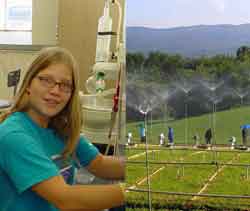College of Agriculture and Life SciencesBiological Systems Engineering
OverviewThe mission of the Department of Biological Systems Engineering (BSE) is to provide the engineering expertise for a sustainable food, fiber, and bioprocessing industry in the state and throughout the world through its teaching, research and extension programs. The teaching program in BSE offers engineering B.S., M.S., and Ph.D. programs and service courses for students enrolled in the College of Agriculture and Life Sciences and other colleges. The degree programs in BSE are administered by the College of Engineering. Therefore, the curriculum and courses offered for the B.S. in biological systems engineering are listed in the College of Engineering section of this catalog. Students interested in pursuing an undergraduate degree program in Biological Systems Engineering must first be admitted to the College of Engineering. Service courses designed to meet the needs of students enrolled in different programs in CALS are listed in the following section. These courses generally are not taken to meet engineering degree requirements except as free electives. Undergraduate Course Descriptions (BSE)Courses for Non-Engineering Students (See College of Engineering for courses for engineering students) 2094: INTRODUCTION TO METAL FABRICATION 4324: NONPOINT SOURCE POLLUTION
College of Agriculture and Life Sciences Programs of Study
Agricultural and Applied Economics | Agricultural and Extension Education | Agriculture and Life Sciences Agriculture Technology | Animal and Poultry Science | Biochemistry | Biological Systems Engineering Crop and Soil Environmental Sciences | Dairy Science | Entomology | Food Science and Technology | Horticulture Human Nutrition, Foods, and Exercise | Plant Pathology, Physiology, and Weed Science |
